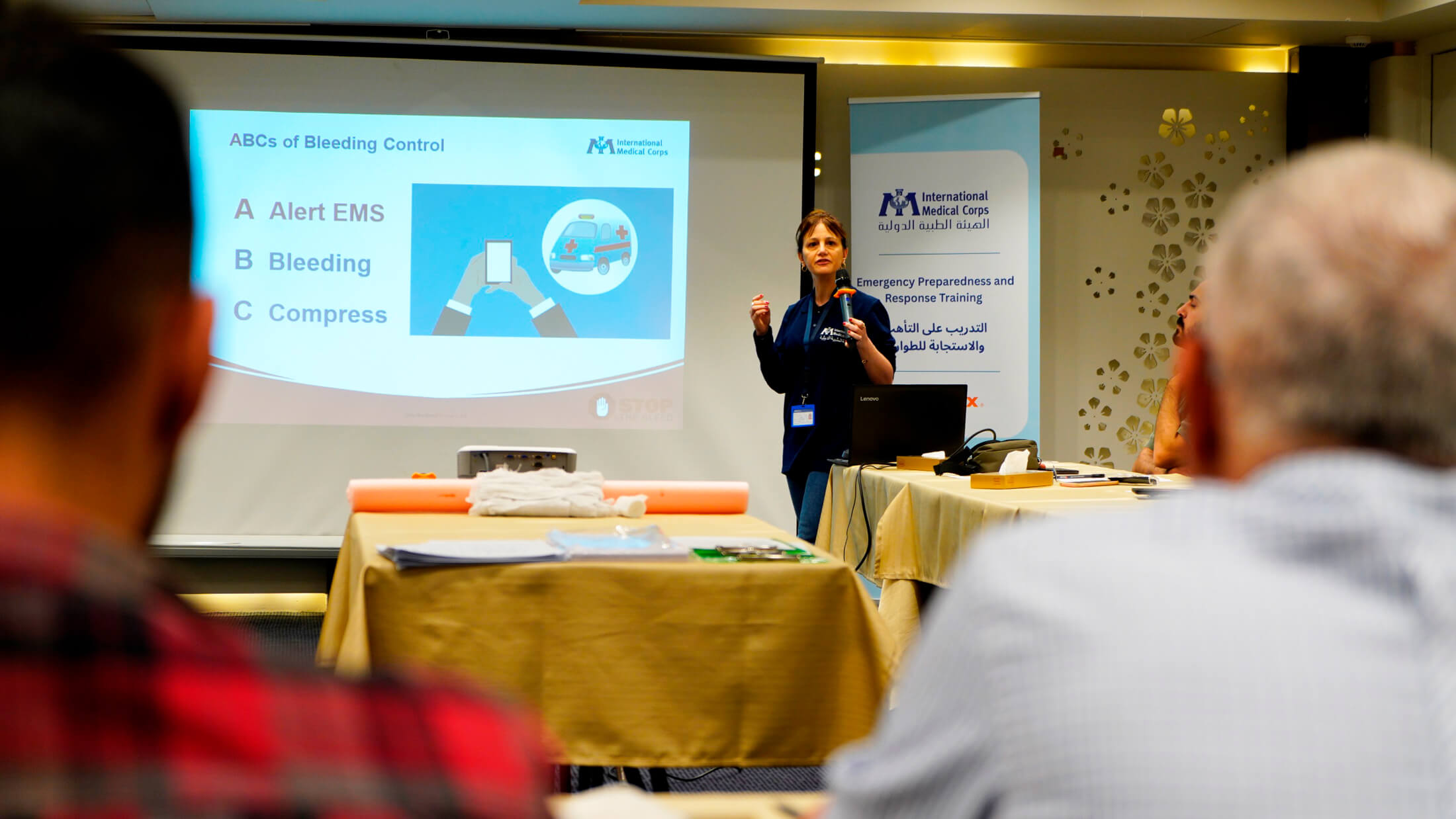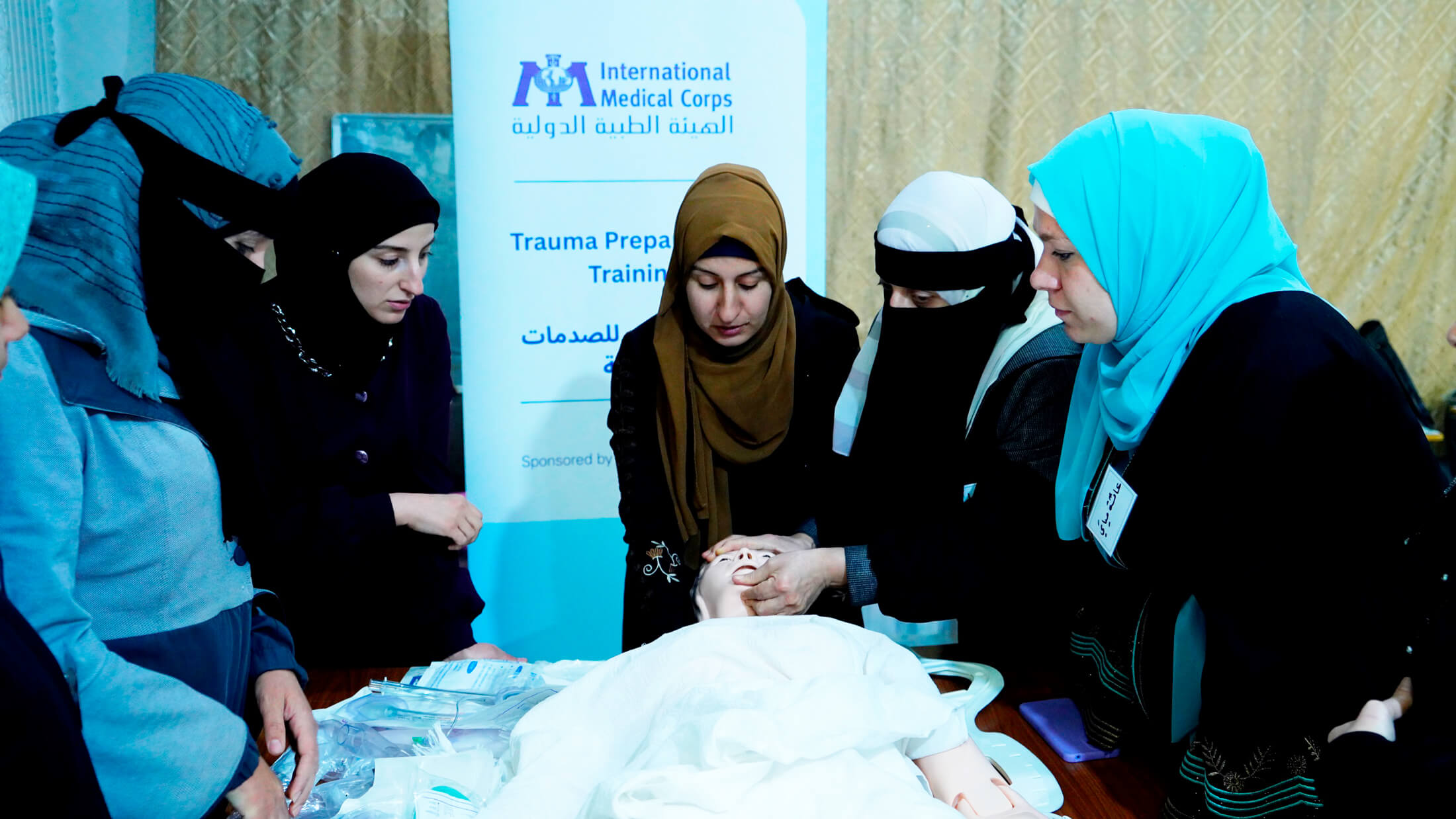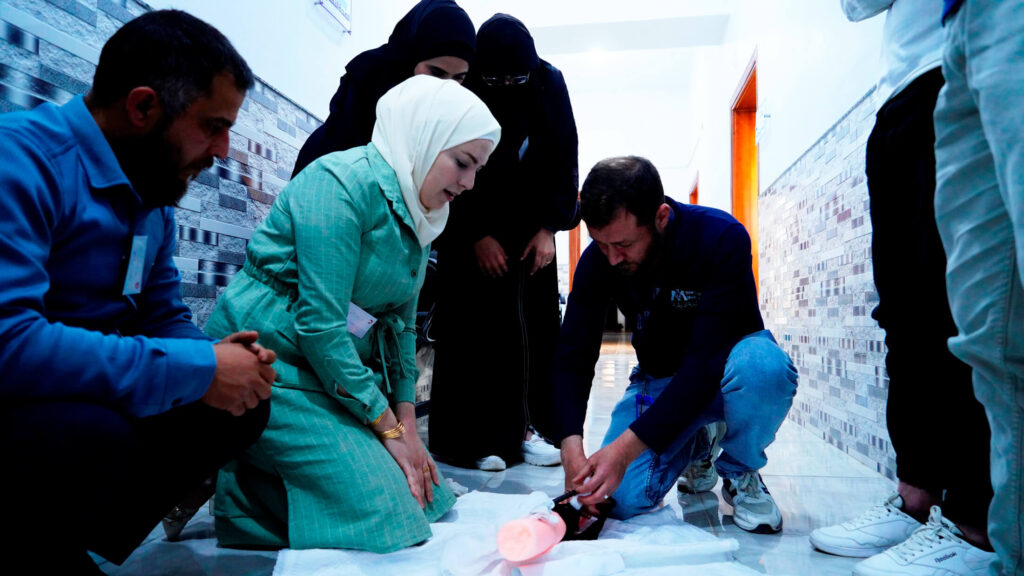Preparedness isn’t just about prepositioning supplies or being ready to deploy when disaster strikes—it’s also about making sure that frontline and healthcare workers have the training and knowledge they need ahead of time.
Our Emergency Response Unit (ERU) has been in the process of formalising an emergency preparedness and response training program since we began our trauma training work in Ukraine with the Harvard Humanitarian Initiative in 2022. This initiative includes various trauma and mass casualty training courses we offer to make sure that health workers, first responders and everyday people are ready to help community members who have been severely wounded. Here’s an overview of the course components.
- The Advanced Trauma Life Support (ATLS) course teaches systematic approaches to caring for trauma patients in higher-resource settings, such as Ukraine.
- The Primary Trauma Care (PTC) course adheres to the principles of the ATLS course but is more flexible and geared toward low-resource settings. The course is for frontline clinical staff working in trauma management, as well as pre-hospital providers and healthcare staff who work in other fields.
- The Basic Emergency Care (BEC) course teaches non-emergency healthcare providers how to treat patients in crisis at a very basic level.
- The Mass Casualty Preparedness and Response in Emergency Units (MCPR) course helps emergency-unit leaders better understand mass casualty and how to manage it. The course also helps trainees create their own mass-casualty management plans for situations where the number of casualties surpasses their resources.
- Stop the Bleed (STB) is a course created by the American College of Surgeons that is designed to help people without a medical background help someone who has been injured and could potentially bleed to death.
In addition to offering ATLS training in Ukraine, the ERU has also run emergency preparedness and response training sessions in Lebanon, Somalia, South Sudan and—most recently—in Jamaica and Syria.

Boosting Capacity in Jamaica
When Hurricane Beryl made landfall first in southwest Jamaica in July 2024, International Medical Corps had teams on the ground in St. Elizabeth Parish within 48 hours. Hurricane Beryl damaged various critical health facilities—including Bellevue Clinic, Newell Maternity Clinic and Southfield Health Centre—rendering them completely non-functional and leaving people without access to healthcare. We helped establish a temporary health clinic and provided medical supplies and equipment (including a generator), infrastructure materials and furniture. With Jamaica now in the recovery phase, ensuring that health facilities have the resources necessary to care for patients remains our top priority.
Throughout our collaboration with the country’s Ministry of Health (MoH), the Office of Disaster Preparedness and Emergency Management (ODPEM) and local NGOs during the initial emergency response, we noted that there was a need for preparedness training and, more specifically, for building capacity in the healthcare system and healthcare workforce, as well as local communities, to respond to emergencies.
As part of our ongoing response and partnership efforts, ERU Senior Advisor Dr. John “JR” Roberts, ERU Specialist Meaghan Sydlowski and volunteer Dr. Kelsey Boyne brought preparedness courses to the island this spring—the first time we’ve conducted trauma training in a country where we have no permanent mission.
“We took the opportunity to showcase our global training initiatives by conducting training in Jamaica,” says ERU Senior Program Manager Karol Bassim. “They have been thrilled with the training we provided. They had partners delivering aid, but no one focused on training and capacity building—except for us.”


To ensure that we met Jamaica’s specific preparedness needs, we provided the BEC course to help the healthcare workforce develop much-needed trauma-care skills, and we offered MCPR to help the country build its healthcare system capacity. The MoH and ODPEM found participants for these courses, and chose trainees who would likely respond to an emergency in the future—including members of the Jamaican Defense Force, Constabulary Force and Fire Brigade, as well as staff from the MoH. To bolster skills among community members, we worked with our NGO partner, Food for the Poor, to offer STB training. We also trained instructors who will be able to deliver these courses on their own in the future. In all, we trained 58 participants and five new instructors in BEC, 40 participants and five new trainers in MCPR, and 103 participants and 12 new instructors in STB.
“International Medical Corps always leaves something behind,” Dr. JR says. “Training is one of the most important things that we do. This is an intervention that will far outlive us.”
Bolstering Preparedness in Syria
Last year, International Medical Corps called for an increase in mass-casualty and trauma-preparedness efforts for programmes in Middle East countries that are at risk of experiencing an escalation in conflict. One of the ways we sought to improve preparedness included training and capacity building using a cascade approach.
“We don’t ever just train people to perform a certain skill—we don’t feel like that is really building capacity, because that’s building dependence on us to come back and deliver the course again,” Dr. JR says. “We do a training-of-trainers course, and then have the instructors we just trained deliver the next course under our supervision. We call this a cascade model.”
With this in mind, we held STB and Primary Trauma Care (PTC) training in Lebanon in April 2024, with each course drawing upon International Medical Corps’ internal instructor roster. Staff members in our Jordan mission who had completed a prior instructor course in Egypt facilitated the PTC course, while ERU staff members taught the STB course. Select staff members from Lebanon as well as Syria completed the instructor course.

In spring of 2025, we prioritised our Syria mission for the next round of cascade trainings—this time with the staff members whom we trained in Lebanon last year facilitating the training. We offered PTC courses to 88 participants and STB courses to 54 participants in Syria—in addition to training eight new instructors on each course.
“The cascade model enables us to rely on our own instructors, rather than using expatriate or external ones,” Meaghan says. “The ERU is hoping to build out an internal roster of instructors in the Middle East region, and eventually implement the same approach in other regions.”
The ERU will continue to provide trauma training—and train new instructors—to help first responders prepare for disaster and provide support at a moment’s notice.
“For various reasons, International Medical Corps is sometimes not able to respond to a disaster, or we’re not able to provide the exact support that’s needed,” Meaghan explains. “Whether or not we’re able to respond when there is a crisis, we are building the capacity of local communities to be better prepared for mass-casualty incidents and to feel confident that if they do encounter a patient situation that’s acute, they have the knowledge and the skills needed to stabilise that person.”
“Equipping people with the skills to respond effectively to traumatic injuries can save countless lives and enhance the resilience of health systems during crisis,” Karol adds. “Investing in these training courses today is a step toward a more prepared tomorrow.”
